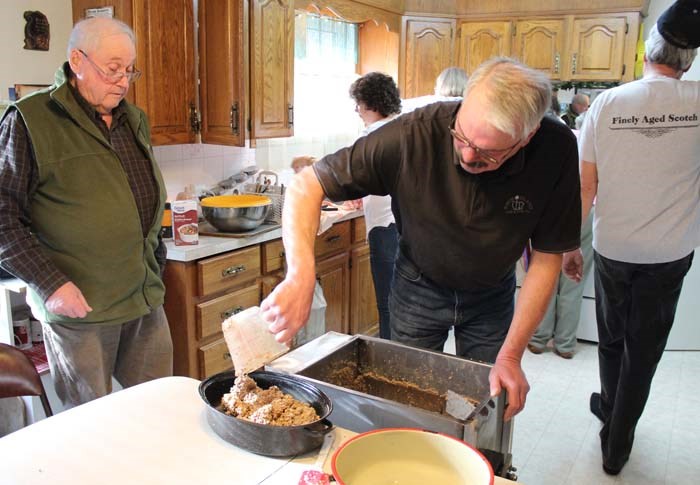Fair fa’ your honest sonsie face,
Great chieftain o the puddin’-race!
Aboon them a’ ye tak your place,
Painch, tripe, or thairm:
Weel are ye worthy o’ a grace
As lang’s my arm.
So begins Robbie Burns’ “Ode to a haggis,” one of his most famous poems and the toast traditionally made at the Yorkton & District Scottish Society’s (YDSS) Annual Robbie Burns Supper.
And so it went on January 21 for the 39th time at the Gallagher Centre following the piping in of the haggis. The toast was consummated with single-malt Scotch, of course.
David Gillard, YDSS president, explained why Scots the world over still celebrate Burns on or near the anniversary of his birth, which was January 25, 1759.
“He was the bard (poet) of Scotland,” Gillard said. “He was a great poet and there’s all nationalities that took to his poetry. He became a very famous man from very humble beginnings.”
“Auld Lang Syne,” a poem by Burns written in 1788 and later set to a traditional folk tune, is sung all over the world at the stroke of midnight December 31 to bid farewell to the past year and welcome the new one.
Gillard also explained why haggis is so central to the celebration.
“Well, Robbie, as a poet, he aligned himself with the poor people and this was a food of the poor people,” he said. When the butchering was done, they got the liver and the heart and that and the laird (lord) got the steaks. This is a good filling food that they could make, they had the ingredients and they used it.”
In Burns’ day, Scottish peasants would boil and grind up a sheep’s heart lungs and liver, mix in beef suet, chopped onions, toasted oatmeal, plenty of black pepper, some salt and enough stock from the boiling of the organs to create a mixture with the consistency of porridge. All of this would be put into the sheep’s cleaned stomach to about half full (to allow room for the expansion of the oatmeal) and boiled for several hours.
Over the intervening decades, things have changed somewhat. Most recipes no longer call for the lungs and the sheep’s stomach is usually replace by beef bung (intestine) or synthetic sausage casings.
The Yorkton group does not even do that any longer.
“We used to always put it in a casing, but they’re hard to get now, so we went to cooking it in a roaster or putting it in a bowl and steaming it,” Gillard said, noting that it does not really affect the taste, but does make a significant difference in the recipe.
“We do use less suet when we’re cooking it this way, with casings we boiled them and a lot of the suet, the fat, would go out through into the water, so now we use quite a bit less suet.
“It works really well, but you don’t get this golden nice skin, they really look nice with the casing,” he said. “We always make one for display so people can see what traditionally it was.”
While the current Scottish Society marked its 39th Robbie Burns Day event, the inaugural supper in 1978 was not the first time the poet’s birthday was celebrated in Yorkton at a public affair.
In its February 1, 1912 edition, The Enterprise reported on what was touted as “the first Annual Celebration in honour of Scotland’s immortal poet.”
“The event was held in the Parish Hall and about seventy guests sat down at the banquet table and thoroughly enjoyed the entire evening’s program which consisted of a supper, a number of songs and speeches and a dance,” the front page article stated.
“Scottish sentiment and loyalty to the memory of the bard whom scotsmen delight to honor, were the predominating features of the evening, the songs the dishes and the decorations all paying tribute to the land of heather and cakes.”
It is a description that would not be inappropriate 105 years later.
As usual, this year’s supper featured pipes and drums; Highland and Scottish country dancing; a buffet dinner of haggis, roast beef, neeps (turnips) and tatties (potatoes); and a dance with music provided by Ed Hickie.
Gillard said the event is always well-supported by the Scottish community, but also attended by people of many other heritages.
“Anybody can be Scottish for the day,” he quipped.



